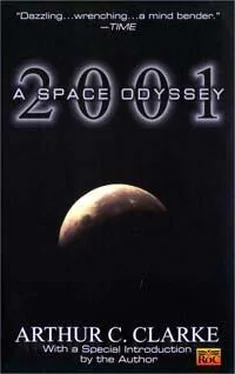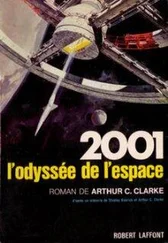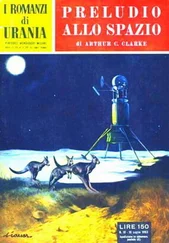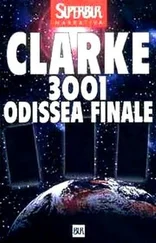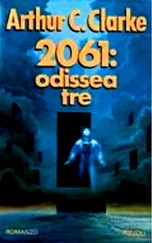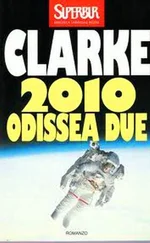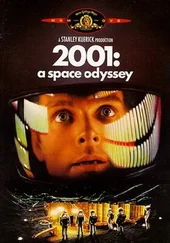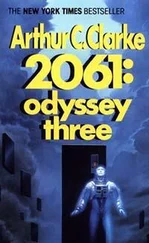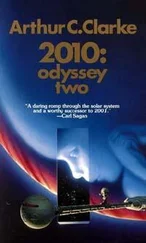Whether Hal could actually think was a question which had been settled by the British mathematician Alan Turing back in the 1940s. Turing had pointed out that, if one could carry out a prolonged conversation with a machine – whether by typewriter or microphone was immaterial – without being able to distinguish between its replies and those that a man might give, then the machine was thinking, by any sensible definition of the word. Hal could pass the Turing test with ease.
The time might even come when Hal would take command of the ship. In an emergency, if no one answered his signals, he would attempt to wake the sleeping members of the crew, by electrical and chemical stimulation. If they did not respond, he would radio Earth for further orders.
And then, if there was no reply from Earth, he would take what measures he deemed necessary to safeguard the ship and to continue the mission – whose real purpose he alone knew, and which his human colleagues could never have guessed.
Poole and Bowman had often humorously referred to themselves as caretakers or janitors aboard a ship that could really run itself. They would have been astonished, and more than a little indignant, to discover how much truth that jest contained.
The day-by-day running of the ship had been planned with great care, and – theoretically at least – Bowman and Poole knew what they would be doing at every moment of the twenty-four hours. They operated on a twelve-hours-on, twelve-hours-off basis, taking charge alternately, and never being both asleep at the same time. The officer on duty remained on the Control Deck, while his deputy saw to the general housekeeping, inspected the ship, coped with the odd jobs that constantly arose, or relaxed in his cubicle.
Although Bowman was nominal Captain on this phase of the mission, no outside observer could have deduced the fact. He and Poole switched roles, rank, and responsibilities completely every twelve hours. This kept them both at peak training, minimized the chances of friction, and helped toward the goal of 100 percent redundancy.
Bowman's day began at 0600, ship's time – the Universal Ephemeris Time of the astronomers. If he was late, Hal had a variety of beeps and chimes to remind him of his duty, but they had never been used. As a test, Poole had once switched off the alarm; Bowman had still risen automatically at the right time.
His first official act of the day would be to advance the Master Hibernation Timer twelve hours. If this operation was missed twice in a row, Hal would assume that both he and Poole had been incapacitated, and would take the necessary emergency action.
Bowman would attend to his toilet, and do his isometric exercises, before settling down to breakfast and the morning's radio-fax edition of the World Times. On Earth, he never read the paper as carefully as he did now; even the smallest items of society gossip, the most fleeting political rumors, seemed of absorbing interest as it flashed across the screen.
At 0700 he would officially relieve Poole on the Control Deck, bringing him a squeeze-tube of coffee from the kitchen. If – as was usually the case – there was nothing to report and no action to be taken, he would settle down to check all the instrument readings, and would run through a series of tests designed to spot possible malfunctions. By 1000 this would be finished, and he would start on a study period.
Bowman had been a student for more than half his life; he would continue to be one until he retired. Thanks to the twentieth-century revolution in training and information-handling techniques, he already possessed the equivalent of two or three college educations – and, what was more, he could remember 90 percent of what he had learned.
Fifty years ago, he would have been considered a specialist in applied astronomy, cybernetics, and space propulsion systems – yet he was prone to deny, with genuine indignation, that he was a specialist at all. Bowman had never found it possible to focus his interest exclusively on any subject; despite the dark warnings of his instructors, he had insisted on taking his Master's degree in General Astronautics – a course with a vague and woolly syllabus, designed for those whose IQs were in the low 130s and who would never reach the top ranks of their profession.
His decision had been right; that very refusal to specialize had made him uniquely qualified for his present task. In much the same way Frank Poole – who sometimes disparagingly called himself "General Practitioner in space biology" – had been an ideal choice as his deputy. The two of them, with, if necessary, help from Hal's vast stores of information, could cope with any problems likely to arise during the voyage – as long as they kept their minds alert and receptive, and continually reengraved old patterns of memory.
So for two hours, from 1000 to 1200, Bowman would engage in a dialogue with an electronic tutor, checking his general knowledge or absorbing material specific to this mission. He would prowl endlessly over ship's plans, circuit diagrams, and voyage profiles, or would try to assimilate all that was known about Jupiter, Saturn, and their far-ranging families of moons.
At midday, he would retire to the galley and leave the ship to Hal while he prepared his lunch. Even here, he was still fully in touch with events, for the tiny lounge-cum-dining room contained a duplicate of the Situation Display Panel, and Hal could call him at a moment's notice. Poole would join him for this meal, before retiring for his six-hour sleep period, and usually they would watch one of the regular TV programs beamed to them from Earth.
Their menus had been planned with as much care as any part of the mission, The food, most of it freeze-dried, was uniformly excellent, and had been chosen for the minimum of trouble; Packets had merely to be opened and popped into the tiny auto-galley, which beeped for attention when the job was done. They could enjoy what tasted like – and, equally important, looked like – orange juice, eggs (any style), steaks, chops, roasts, fresh vegetables, assorted fruits, ice cream, and even freshly baked bread.
After lunch, from 1300 to 1600 Bowman would make a slow and careful tour of the ship – or such part of it as was accessible. Discovery measured almost four hundred feet from end to end, but the little universe occupied by her crew lay entirely inside the forty-foot sphere of the pressure hull.
Here were all the life-support systems, and the Control Deck which was the operational heart of the ship. Below this was a small "space-garage" fitted with three airlocks, through which powered capsules, just large enough to hold a man, could sail out into the void if the need arose for extravehicular activity.
The equatorial region of the pressure sphere – the slice, as it were, from Capricorn to Cancer – enclosed a slowly rotating drum, thirty-five feet in diameter. As it made one revolution every ten seconds, this carrousel or centrifuge produced an artificial gravity equal to that of the Moon. This was enough to prevent the physical atrophy which would result from the complete absence of weight, and it also allowed the routine functions of living to be carried out under normal – or nearly normal – conditions.
The carrousel therefore contained the kitchen, dining, washing, and toilet facilities. Only here was it safe to prepare and handle hot drinks – quite dangerous in weightless conditions, where one can be badly scalded by floating globules of boiling water. The problem of shaving was also solved; there would be no weightless bristles drifting around to endanger electrical equipment and produce a health hazard.
Around the rim of the carrousel were five tiny cubicles, fitted out by each astronaut according to taste and containing his personal belongings. Only Bowman's and Poole's were now in use, while the future occupants of the other three cabins reposed in their electronic sarcophagi next door.
Читать дальше
